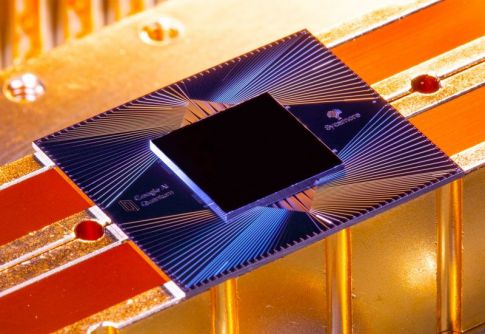
Credit: Erik Lucero
Over the past couple of months there's been renewed interest, and quite some intrigue, surrounding quantum computing. As you'll know from the special edition of the podcast with quantum physicist and FQXi blogger Ian Durham we posted in October, there was a news leak in September suggesting that a team at Google had achieved 'quantum supremacy' for the first time. This is the milestone at which a quantum computer performs a specific task that lies beyond the practical reach of a classical computer. At the time that we posted the podcast, the rumour was that Google's quantum processor, Sycamore, had solved a random number generation problem in just 200 seconds. The claim was that the world's best classical computer would need 10,000 years to perform the same task. Since then, the team has officially published their results in Nature.
October 6, 2019
Quantum Supremacy Milestone? Rumours abound that Google's quantum processor Sycamore has performed a task that would flummox the best classical computer — a first in quantum computing. Physicist Ian Durham assesses the claims, gives us a quantum computing primer, and discusses concerns about the term 'quantum supremacy'.
Full Podcast
The plot thickened in October, however, when IBM hit back with a
blog post in which some of their researchers claimed that the result was perhaps not quite as supreme as Google claimed, saying:
"Recent advances in quantum computing have resulted in two 53-qubit processors: one from our group in IBM and a device described by Google in a paper published in the journal Nature. In the paper, it is argued that their device reached "quantum supremacy" and that "a state-of-the-art supercomputer would require approximately 10,000 years to perform the equivalent task." We argue that an ideal simulation of the same task can be performed on a classical system in 2.5 days and with far greater fidelity. This is in fact a conservative, worst-case estimate, and we expect that with additional refinements the classical cost of the simulation can be further reduced.
"Because the original meaning of the term "quantum supremacy," as proposed by John Preskill in 2012, was to describe the point where quantum computers can do things that classical computers can't, this threshold has not been met."
I'm sure Ian and I will be discussing where things stand in this debate during our end of year run-down on the podcast in a few weeks. But regardless of the status of this particular result, it's certainly worth talking more about the practical future for quantum computers. The random number task performed by Sycamore, which Ian chats about on the podcast, isn't a hugely useful one. The point of the test was just to show that quantum computers can do something that a classical computer cannot. But what do scientists hope quantum computers will be good for, eventually? That was the subject of a panel discussion at FQXi's 6th international meeting in Tuscany, featuring quantum physicists Scott Aaronson, of the University of Texas in Austin, Mile Gu, of the Nanyang Technological University, Michele Reilly, of Turing Inc, and Seth Lloyd, at MIT, all moderated by Catalina Curceanu, of INFN, Italy.
You can watch the full panel discussion now. Aaronson listed the most famous applications: simulating chemistry and physics (with applications in material science), breaking cryptography, speeding up database searches, enhancing machine learning, and using quantum computers to prove that random bits are really random. Gu looked further to the future, pondering whether quantum computers might help solve the quantum measurement problem. Reilly noted that however powerful quantum computers may or may not become, it is worth remembering that every quantum computer needs (costly) classical peripherals.
[youtube:zW6ZtIPCPEs, 560, 315]
Lloyd meanwhile talked about what's already being done, and gamely sang a Gilbert and Sullivan inspired ode to quantum computers. Here are the lyrics for your amusement:
Qubit Willow
In a superconducting circuit a little qubit
sang Entangled, entangled, unentangled.
And I said to it `Qubit, oh why do you sit
singing Entangled, entangled, unentangled?
Is it just decoherence, qubit,' I cried,
`or a nasty quasi-particle in your little inside?'
With a shake of its poor little head it replied
Entangled, entangled, unentangled.
Its flux fluctuated as it sat on that chip,
oh Entangled, entangled, unentangled.
Its Josephson junctions were having a pip,
entangled, entangled, unentangled.
It sighed and it sobbed and a quantum jump it made
as it lost all the phase of its de Broglie wave,
and a spin echo arose from the suicide's grave:
Entangled, unentangled, entangled.
Now I feel just as sure as I'm sure that my name
isn't Engtangled, entangled, unentangled,
that it was not spontaneous collapse of the wave function that made it exclaim
Entangled, entangled, unentangled.
If my neurons interact with the universe I
shall decohere as it did and you will know why,
but I probably shall not exclaim as my decoherence dies,
Entangled, entangled, unentangled.
Seth Lloyd, FQXi, Barga Italy, July 2019